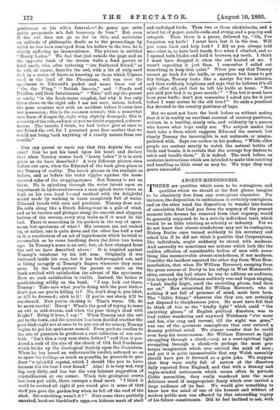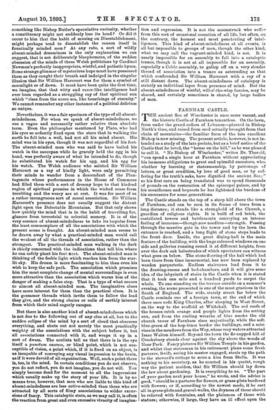ABSENT-MINDEDNESS.
THERE are qualities which seem to be contagious, and qualities which we should at the first glance imagine to be absolutely free from any contagious character. For instance, the disposition to enthusiasm is certainly contagious, and on the other hand the disposition to wander into trains of association that lead you from the urgency of the present moment into dreams far removed from that urgency, would be generally supposed to be a strictly individual trait, which would be as little catching as sobriety or industry. Yet we do not know that absent-mindedness may not be contagions. Bishop Butler once turned suddenly to his secretary and asked him if he did not think it possible that Corporations, like individuals, might suddenly be struck with madness. And assuredly we sometimes see actions which look like the sudden affliction of considerable bodies of men with some- thing like inconceivable absent-mindedness, if not madness. Consider the incident reported the other day from West Mon- mouthshire, that when Sir William Harcourt, escaping from the great reverse of Derby to his refuge in West Monmouth- shire, entered the hall where he was to address an audience, that large body of Welshmen suddenly rose and began singing, "Lead, kindly Light, amid the encircling gloom, lead thou me on." How astonished Sir William Harcourt, who is nothing if not full of presence of mind, must have been. The "Celtic fringe," whatever else they are, are certainly not disposed to blasphemous jokes. He must have felt that to think of hint as the "kindly light" which amid "the encircling gloom" of English political disasters, was to lead rather wandering and wayward Welshmen "o'er moor and fen, o'er crag and torrent, till the night was gone," was one of the quaintest conceptions that ever entered a dreamy political mind. We almost wonder that he could even keep his countenance. Sir William Harcourt as light struggling through a cloud,—nay, as a semi-spiritual light struggling through a cloud,—is perhaps the most gro- tesque imagination which ever entered the mind of man ; and yet it is quite inconceivable that any Welsh assembly should have put it forward as a grim joke. We suppose that they were really full of sorrow at the disasters daily reported from England, and that with a dreamy and vague-minded seriousness which seems often to pervade Celtic assemblies, they really wandered into the most delirious mood of inappropriate fancy which ever carried a large audience off its feet. We would give something to know how the mind of one of the keenest and wittiest of modern public men was affected by that astounding vagary of his future constituents. Did he feel inclined to ask, with
something like Bishop Butler's speculative curiosity, whether a constituency might not suddenly lose its head ? Or did it occur to him that the habit of musing on Disestablishment, might perhaps tend to disestablish the reason itself in fanatically minded men ? At any rate, a sort of wildly absent-minded dreaminess is the only explanation we can suggest, that is not deliberately blasphemous, of the sudden obsession of the minds of these Welsh politicians by Cardinal Newman's perfectly inappropriate, wistful, and pathetic hymn. Some strange glimmer of mysterious hope must have possessed them as they caught their breath and indulged in the singular illusion that Sir William Harcourt was for them a symbol of moonlight or of dawn. It must have been quite the first time, we imagine, that that witty and razor-like intelligence had ever been regarded as a struggling ray of that spiritual sun which "rises from the azure sea, like breathings of eternity." We cannot remember any other instance of a political delirium so unique.
Nevertheless, it was a fair specimen of the type of all absent- mindedness. For when we speak of absent-mindedness, we use a vague and necessarily rather relative than absolute term. Even the philosopher mentioned by Plato, who had his eyes so ardently fixed upon the stars that in walking the earth he fell into a well, had not all his mind absent. His mind was in his eyes, though it was not regardful of his feet- The absent-minded man who was said to have boiled his watch in the saucepan while he gravely held the egg in his hand, was perfectly aware of what he intended to do, though he substituted his watch for his egg, and his egg for his watch. The Welsh audience who saluted Sir William Harcourt as a ray of kindly light, were only permitting their minds to wander from a descendant of the Plan- tagenets whose performances in the House of Commons had filled them with a sort of dreamy hope to that kindred region of spiritual promise in which the wicked cease from troubling and the weary are at rest. It was for most of us a rather incongruous sort of moral association. Sir William Harcourt's presence does not usually suggest the distant light upon the Delectable Mountains. But that only shows how quickly the mind that is in the habit of travelling far, glances from terrestrial to celestial scenery. It is of the very essence of absent-mindedness to take its impulse from the least commonplace of all the associations with which the present scene is fraught. An absent-minded man seems to be drawn away by what a practical-minded man would call the weakest of all the threads of association, rather than the strongest. The practical-minded man walking in the dark is chiefly concerned with the indications that tell him where he can safely plant his foot next. The absent-minded man is thinking of the feeble light which reaches him from the star- lit sky. His dream is more fascinating to him than even his wish to keep the safe path. The association which promises him the most complete change of mental surroundings is even more attractive than the association which warns him of the -clanger of making a false step. That is a type of what occurs to almost all absent-minded men. The imaginative clues have more interest for them than the practical clues. It is the gossamer threads which invite them to follow the lead they give, and the strong chains or coils of earthly interest from which their mind eagerly escapes.
But there is also another kind of absent-mindedness which is not due to the following out of any clue at all, but to the sudden eclipse of the mind by a sort of cloud that obscures everything, and shuts out not merely the most practically weighty of the associations with the subject before it, but all associations connected with it, and wraps it up in a sort of dwam. The oculists tell us that there is in the eye itself a punctum caecum, or blind point, which is not sus- ceptible of vision, a point which, if it is fixed on an object, is as incapable of conveying any visual impression to the brain, as if it were devoid of all organisation. Well, such a point there is, too, in the mind. In certain conditions you do not observe, you do not reflect, you do not imagine, you do not will. You simply become dead for the moment to all the impressions -which usually make up the story of your life. It is by no means true, however, that men who are liable to this kind of absent-mindedness are less active-minded than those who are attracted by all sorts of filmy associations to wilder excur- sions of fancy. This cataleptic state, as we may call it, is often the reaction from great and even excessive vivacity of imagina-
tion and expression. It is not the moonstruck who suffer from this sort of occasional cessation of all life, but often, on the contrary, the keenest and most penetrating of intel- ligences. This kind of absent-mindedness at all events, is all but impossible to groups of men, though the other kind, what we may call the vagrant-minded kind, is not. It is nearly impossible for an assembly to fall into a cataleptic trance, though it is not at all impossible for an assembly, especially a Celtic assembly, to gallop off on a very slender thread of association into a trance as astounding as that which confounded Sir William Harcourt with a ray of a still distant dawn. The absent-mindedness of catalepsy is strictly an individual lapse from presence of mind. But the absent-mindedness of wistful, will-o'-the-wisp fancies, may be shared, and certainly sometimes is shared, by large bodies of men.



































 Previous page
Previous page